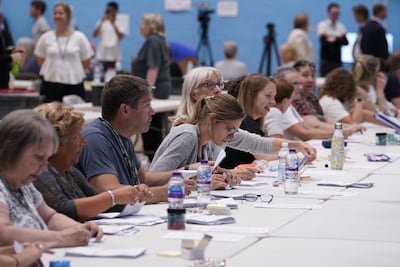Meet the new class of voter expected to turn out in the UK’s general election, which was announced on Wednesday and will wrap up in early July. It turns out many will be much like the old voter.
The ruling Conservative Party face the realistic prospect of opposition for the first time in more than a decade, with polls showing it at an average of 21 percentage points behind Labour.
However, this summer’s election will be significant for another reason.
For the first time, expats who have lived abroad for more than 15 years will be eligible to vote in a nationwide poll.
Part of the UK government's Election Act, passed in 2022, the move affects up to three million citizens living abroad who have either previously lived in or been registered to vote in Britain.
The change in law came after a challenge raised by the late Harry Shindler, a Briton who fought a 20-year campaign to end the 15-year limit on voting rights, eventually bringing the case to the European Court of Justice.
Mr Shindler, who died in February aged 101, said the UK was "not a complete democracy” until all British people were given the right to vote.
Long-term British expats living in the UAE welcomed the move to extend voting rights when the rule came into force in January.
And many say they are now eager to cast their ballots in July.
For Jennifer Brown, a Scot living in Abu Dhabi, it will be the first time she has been eligible to vote in years, having moved abroad in 2005.
She found online registration straightforward, signing up months ago with her passport and National Insurance numbers after the change was announced. She has opted for a postal vote.
She told The National: “This is the first time I could vote in a long time so I registered to vote as soon as they opened it.
“I’m traditionally Conservative but the party are in a mess and they can’t seem to find a strong leader. The last few years have been chaotic and disappointing. For now I’m undecided, but I will come to a decision because I won’t be wasting my right to vote.”
Keren Bobker, administrator of the British Expats Dubai and UAE Facebook page, and a columnist for The National, is in the same position, having moved abroad in 2006.
She re-registered to vote a couple of months ago and said the ability to cast her ballot from abroad was important to her. She is happy with the idea of a Labour government, which she said appears to be a “foregone conclusion”.

“Even after being out of the UK since 2006, with no current plans to live there again, I have UK assets, property and family there and UK legislation affects UK citizens no matter where they live,” she said.
Ms Bobker said registration took “minutes” via the UK Gov website with her passport and National Insurance numbers and she received an email to confirm a day or two later.
However, she opted for a proxy vote since she had faced issues in the past obtaining postal votes, she said, “not least as my local council are very unhelpful – so I have registered for a proxy vote and my father will register my vote”.
Ms Bobker said she had not seen any official awareness campaigns to promote voting among expats, but she is using her Facebook group to reach people who are eligible.
Members of the group said they had also signed up in a discussion about the topic, with one writing: "Just set up my proxy vote."
Who can vote
You must be either a British citizen, or an eligible Irish citizen registering to vote in Northern Ireland.
Registration
The first step is registration.
In Northern Ireland you must register via a paper form but it can be done online for the rest of the UK.
You will need to provide details such as your passport number, plus the address and time you were last registered or resident in the UK.
Local authorities, which are responsible for the electoral roll in their area, must be able to verify your identity and past connection to the area.
You can find contact details for the relevant local council by entering the postcode of the last place you lived in the UK, using the commission's postcode tool.
How to vote – proxy or post
After registration, voters can choose whether to vote by proxy or post.
The government recommends anyone who lives abroad to apply to vote by proxy if the election or referendum is less than two weeks away. This means you will ask someone who is already a registered voter to vote on your behalf. They must be eligible to vote in the election and bring their ID.



























































































